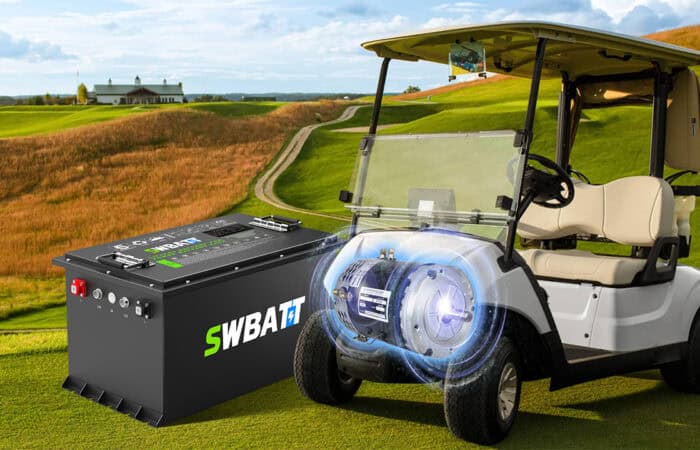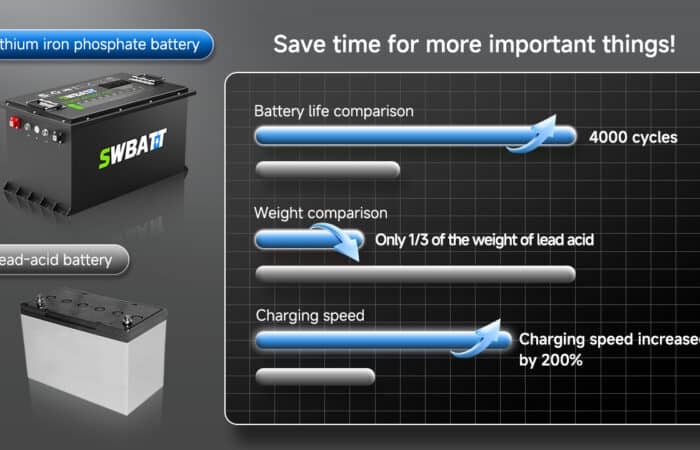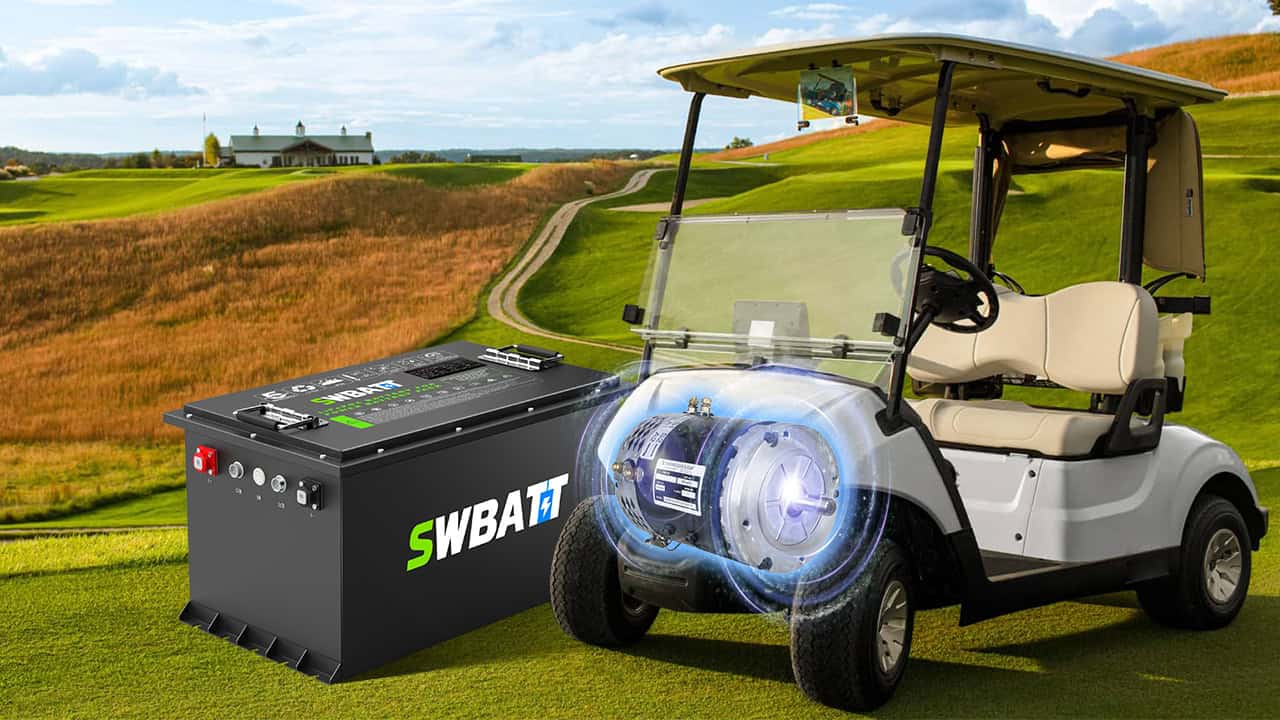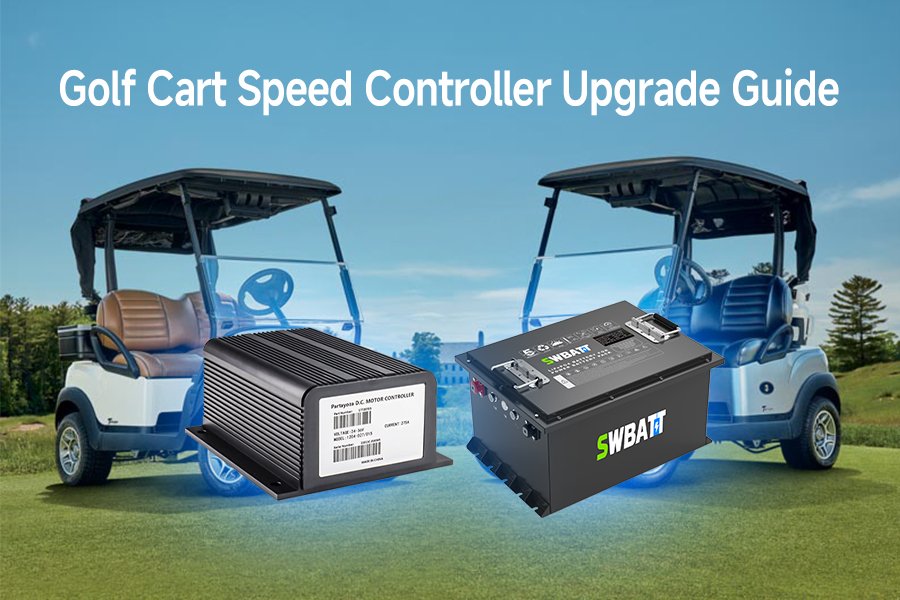Converting your golf cart to lithium batteries and adding a high-speed motor can unlock significant performance gains – increased speed, torque, and range. However, this combination can also introduce potential problems if not handled correctly. This guide addresses the common issues when pairing lithium batteries with high-speed golf cart motors, providing practical solutions and expert advice. We’ll focus on the technical aspects, helping you understand why these problems occur and how to prevent them.

High Current Demand and Lithium Battery Characteristics
Table of Contents
ToggleThe core issue stems from the high current demands of high-speed golf cart motors, particularly series-wound DC motors, which are popular for their high starting torque. These motors can draw substantial current, especially under acceleration and heavy loads. While lithium batteries offer numerous advantages over lead acid (higher energy density, lighter weight, longer lifespan), they also have specific characteristics that must be considered.
1. High-Speed Golf Cart Motors: Defining “High-Speed”
“High-speed” in the context of golf cart motors is relative. A stock golf cart motor might have a top speed of 12-15 mph. Upgraded motors can achieve speeds of 20-25+ mph, and some specialized motors can go even faster. This increased speed comes with increased power demands. Key parameters to consider:
- RPM (Revolutions Per Minute): Higher RPM generally means higher speed.
- Wattage/Horsepower: A higher wattage or horsepower rating indicates a more powerful motor.
- Current Draw (Amps): This is the critical factor. A stock motor might continuously draw 50-100 amps, while a high-speed motor can quickly draw 150-200+ amps or even higher peak currents. This is where problems often arise.
2. Lithium Battery Voltage Drop (and Why It Matters)
Unlike lead-acid batteries, which exhibit a significant voltage drop as they discharge, lithium iron phosphate (LiFePO4) batteries – the most common type used in golf carts – maintain a relatively stable voltage throughout most of their discharge cycle. However, even LiFePO4 batteries experience some voltage drop under heavy load. This is due to internal resistance within the battery cells and connections.
- Excessive Voltage Drop: If the voltage drops too low, the Battery Management System (BMS) can shut down the battery to protect it from damage (under-voltage protection). This can also cause the motor controller to malfunction or reduce performance.
- Source: Battery University explains voltage drop and internal resistance in detail: https://batteryuniversity.com/article/bu-202-internal-resistance
3. The Crucial Role of the Battery Management System (BMS)
The BMS is the “brain” of a lithium battery pack. It monitors voltage, current, temperature, and other parameters to ensure safe and optimal operation. Key BMS protections relevant to high-speed motors include:
- Over-Current Protection (OCP): Limits the maximum current drawn from the battery. This is crucial for preventing damage from excessive current draw.
- Under-Voltage Protection (UVP): This feature shuts down the battery if the voltage drops below a safe threshold, preventing over-discharge.
- Over-Temperature Protection (OTP): This feature shuts down the battery if it gets too hot. A high current draw generates heat.
- Short-Circuit Protection (SCP): Protects against short circuits.
4. Motor Controller Compatibility
The motor controller is responsible for regulating the power delivered to the motor. It’s essential to ensure the motor controller is compatible with:
* Lithium Battery Voltage: The controller must be rated for the nominal voltage of the lithium battery pack (e.g., 48V).
* High Current Demands: The controller must be able to handle the high-speed motor’s peak and continuous current draw
* Lithium Battery Discharge Profile: Some older controllers designed for lead-acid batteries may not work optimally with the flatter discharge curve of lithium batteries.
Golf Cart Lithium Battery Troubleshooting Guide
BMS Shutdown (Battery Turns Off)
Possible Causes: Undersized battery (low capacity/C-rating); Excessive current draw; Low voltage cutoff triggered; Over-temperature; Faulty BMS.
Solutions: Upgrade to a higher-capacity battery with a higher C-rating; Check motor and controller specifications; Verify BMS settings; Ensure proper cooling; Inspect wiring and connections.
Reduced Speed/Power
Possible Causes: Voltage drop under load; Undersized battery; Motor controller limitations; Incorrect motor/controller settings.
Solutions: Use a battery with a higher C-rating; Check motor controller compatibility and settings; Upgrade wiring if necessary.
Motor Overheating
Possible Causes: Excessive current draw; Inadequate cooling; Motor controller issues; Incorrect gear ratio.
Solutions: Check motor specifications; Improve cooling (add a fan, ensure proper ventilation); Verify motor controller settings; Adjust gear ratio if necessary; Consult a motor specialist.
Battery Draining Quickly
Possible Causes: high current draw; inefficient motor/controller; parasitic loads (accessories draining power when the cart is off); battery degradation.
Solutions: Optimize driving habits; check motor and controller efficiency; identify and eliminate parasitic loads; test battery capacity.
Charger Issues
Possible Causes: Incompatible charger, incorrect charger settings, or faulty charger.
Solutions: Use a charger specifically designed for LiFePO4 batteries; verify charger voltage and current settings; test with a known-good charger.
Controller Issues
Possible Causes: Incompatible controller, incorrect controller settings, or faulty controller.
Solutions: Make sure the controller is compatible with Lithium batteries and rated for the motor’s voltage and current; verify settings; consult with a professional to diagnose the controller.
Voltage Sag
Possible Causes: improperly installed DC-DC Converter, incorrect wiring, or battery issues.
Solutions: Ensure the converter is correctly installed. If you’re not experienced with electronics, consult a professional.
Choosing the Right Components: A Step-by-Step Guide
Determine Your Motor’s Current Requirements: Consult the specifications (data sheet or manufacturer’s website) to find its continuous and peak current draw.
- Select a Battery with Sufficient Capacity (Ah) and Discharge Rate (C-rating): Capacity (Ah) Determines how long the battery will last on a single charge. Consider your typical driving distance and frequency of charging.
- C-Rating: Determines the maximum continuous current the battery can safely deliver. Use the formula from the previous response to calculate the required C-rating. Always choose a battery with a C rating that meets or exceeds the motor’s peak current draw.
Choose a Compatible Motor Controller: Ensure the controller is rated for the voltage and current of your chosen battery and motor.
Verify BMS Specifications: Make sure the BMS can handle the peak current draw of the motor and has appropriate protection settings.
Use a Lithium-Specific Charger: Never use a lead-acid charger with a lithium battery.
Consider a DC-DC Converter: If you need to run 12V accessories (lights, radio, etc.) from a higher-voltage battery pack (e.g., 48V), use a DC-DC converter to decrease the voltage. This prevents damage to your accessories.
Proper Wiring and Connections: Use appropriately sized wiring and high-quality connectors to handle the current. Poor connections can cause voltage drop and overheating.
Discover Advanced Lithium Battery Solutions
Explore SWBATT‘s innovative LifePO4 batteries for electric vehicles, energy storage, and more. Tailored solutions to meet your energy needs with efficiency and sustainability.
Converting a golf cart to lithium batteries with a high-speed motor can present several challenges. Let’s explore the most common issues and how to address them:
Voltage Mismatches and Compatibility
High-speed motors often require higher voltages than traditional lead-acid batteries can provide. If the lithium battery’s voltage does not match the motor’s requirements, you may encounter performance issues or even damage.
Solution: Carefully select a lithium battery with the correct voltage rating and ensure it is compatible with the motor. Consulting with a professional can help avoid compatibility issues.
Battery Management System (BMS) Challenges
The Battery Management System (BMS) ensures that the lithium battery operates safely and efficiently. However, improper integration of the BMS with the high-speed motor can lead to performance problems.
Solution: Choose a BMS designed explicitly for your motor and battery system. This ensures balanced power distribution and prevents overheating or reduced battery life.
Overheating Motors
High-speed motors draw more energy, which can result in excessive heat. If the motor overheats, it can lead to performance degradation and potential damage.
Solution: Ensure adequate ventilation and cooling systems to prevent overheating. A heat management solution can help maintain optimal performance and extend motor lifespan.

Installation Challenges and Retrofitting Older Models
Converting to lithium batteries in an older golf cart can present installation challenges. Many older models weren’t designed with modern lithium technology in mind, which can lead to issues during retrofitting.
Common Installation Issues:
Incompatible Wiring Systems: Old wiring systems may not be able to handle the power demands of lithium batteries, leading to potential safety hazards such as overheating or short circuits.
Space Constraints: Lithium batteries may require different configurations and space in older carts may be limited.
Structural Modifications: Be prepared for potential changes in weight distribution and mounting points, as they may need to be adjusted to accommodate lithium batteries. This awareness will help you plan your conversion process effectively.
Solution: To ensure a successful installation, it’s essential to conduct a detailed assessment of your cart’s electrical system and physical space. This reassurance will give you the confidence to proceed with your conversion.
Troubleshooting and Maintenance for Lithium Golf Carts
Once the conversion is complete, maintaining a lithium-powered golf cart requires ongoing care. Common issues, such as reduced range, power cuts, or charging difficulties, may arise.
Troubleshooting Tips:
Check All Connections: Loose or corroded connections can cause power loss.
Inspect Battery Health: Look for signs of imbalance or wear, which could reduce efficiency.
Test Charging System: Ensure the charger is compatible with lithium batteries and outputs the correct voltage and current.
Maintenance Considerations for Lithium Batteries
Lithium batteries require different maintenance practices than lead-acid batteries. For instance, lithium batteries do not need water top-offs but require periodic cell balancing to ensure they charge and discharge evenly.
Routine Maintenance Includes:
Balancing Battery Cells: This helps improve efficiency and extend battery life.
Avoiding Deep Discharge: Lithium batteries should not be fully discharged; partial charges help preserve battery health.
BMS Updates: Regularly update the BMS software to ensure optimal battery management.
Cost-Benefit Analysis of Lithium Conversion
While the initial costs for lithium battery conversion can be high, the long-term benefits often outweigh the investment. Benefits include reduced maintenance costs, longer battery life, and improved performance.
Cost Considerations:
Upfront Costs: The cost of lithium batteries, controllers, and installation.
Long-Term Savings: Reduced maintenance and fewer battery replacements.
User experiences often show that while the conversion is costly initially, the return on investment is substantial due to improved performance and reduced upkeep.
Conclusion: Enhancing Golf Cart Performance with Lithium Batteries and High-Speed Motors
Converting your golf cart to a lithium battery system paired with a high-speed motor can significantly enhance its performance. However, it’s essential to approach the conversion process with careful planning and consideration of potential challenges like voltage mismatches, BMS integration, and overheating.
With the proper preparation and professional help, you can enjoy the numerous benefits of this upgrade, including increased speed, longer battery life, and faster charging. By following these guidelines and troubleshooting tips, you can ensure a successful and smooth transition to a lithium-powered, high-speed golf cart.
Embrace the Future of Golf Cart Technology: Lithium batteries represent the next step in golf cart performance, offering a cutting-edge solution for users looking to maximize their carts’ speed, efficiency, and reliability.
Frequently Asked Questions (FAQs)
- Q: Why does my golf cart shut down when I accelerate hard with a lithium battery and high-speed motor?
- A: This is likely due to the BMS’s over-current protection (OCP) or under-voltage protection (UVP) being triggered. The high current draw of the motor is either exceeding the battery’s capabilities or causing a significant voltage drop. Search Intent: “Golf cart lithium battery shuts down acceleration.”
- Q: Can I use my old lead-acid charger with my new lithium battery?
- A: No. Lithium batteries require a specific charging profile that lead-acid chargers do not provide. Using the wrong charger can damage the battery and create a safety hazard. Search Intent: “Charge lithium golf cart battery with lead acid charger.”
- Q: What C-rating do I need for my lithium golf cart battery?
- A: The required C-rating depends on your motor’s peak current draw. Calculate it using the earlier formula, and always choose a battery with a C-rating that meets or exceeds that value. Search Intent: “golf cart lithium battery C rating”
- Q: My lithium golf cart battery is losing range quickly. What could be the problem?
- A: Several factors could contribute to reduced range, including increased resistance in the system, an inefficient motor or controller, and issues with the battery.
Conclusion:
Successfully upgrading your golf cart with a lithium battery and a high-speed motor requires careful planning and component selection. Understanding the interplay between voltage, current, the BMS, and the motor controller is crucial for avoiding common problems like voltage drop and BMS shutdowns. By following the guidelines in this article and consulting with experienced professionals when needed, you can enjoy the benefits of both lithium power and enhanced speed safely and reliably. Contact SWBATT today for expert advice and customized lithium battery solutions for your golf cart.




